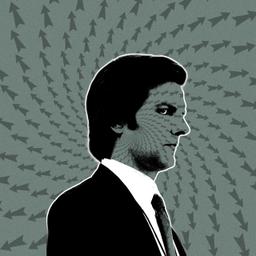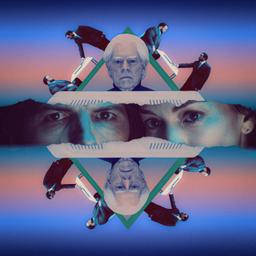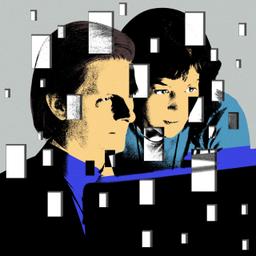
The leader of the severed floor desires to glide but is bound to tumble. He’s mustachioed and all mixed up inside, but put Severance’s Mr. Milchick on any makeshift stage and this interplay outwardly results in utter tomfoolery. Spin a jazz record and he’ll break down into a grinning shimmy; give the man a marching band and he’ll emerge a dashing drum major. He’s inclined to stunt. Rhetorically, socially, sometimes even unwittingly.
So comes his downfall. Something, inevitably, ruins the moment. The show’s corporate Icarus flies too close to the sun. Milchick is, in this light, a striver often cleaning a mess of his own making. The brother just can’t help himself. That’s who he’s at war with.
“I wanted to create a character that basically moves like a duck on water,” says Tramell Tillman, the man behind the middle-management totem. “Calm, but underneath the surface, there’s so much movement.”
It’s early March—a few weeks before Thursday’s finale of the Apple TV+ sci-fi puzzle’s long-awaited sophomore season—and Tillman is picking at both his performance and the self-contained multitudes of his theatrical persona. As we talk, he’s wearing a buttermilk-hued, soft, collared shirt that’s liable to flunk Lumon dress code. Milchick’s meticulously coiffed Afro is gone. Instead, he sports a trimmer look, just short enough to hold a curl. (A full beard complements the actor’s signature mustache.)
On-screen, he’s been all over the place this season. Flexing, failing, fretting. A promotion ain’t always what it says it is. Gone are Season 1’s short-sleeve oxfords; from Milchick’s new perch, he tends toward dim turtlenecks, prim blazers, and a general vibe of escalating paranoia. In one episode, there’s verbal self-flagellation in an office storeroom. In another, he makes a kid crush their own toy in similar Chekhovian fashion. If Season 1’s Milchick was the embodiment of a certain kind of bureaucracy and faith in it, Season 2’s focus is the internal erosion of both those creeds.
Somewhere along the way—between Tillman’s pre-medical education, formal theater training, years grinding away at nonacting nonprofit gigs, and professional stage work—he mastered the forms of dramatic and comedic physicality that make Milchick poke out like a cowlick. His verbosity, off-kilter comportment, and disturbing corporate piety all blend to form Severance’s most arresting character. Linguistic highlights include: frequent use of words like “frivolity” and “tumult,” complimenting someone for having a “mind as sharp” as their “incisors,” (rightfully) bludgeoning a superior with the comeback “devour feculence,” and once asking a coworker if he told another employee that he “fucked her outie” only to follow the query by adding, “Have a restful evening.”
By the end of Thursday’s finale, Milchick is literally surrounded on all sides by the human consequences of his administrative devotion, staring down a crowd of hostile severed employees, Training Day–style. In Tillman’s eyes, this descent was long coming: “I don’t think he ever had control.” Where that’ll take Milchick from here is less clear. Like the show, when it comes to the man who makes the severed floor churn, there’s plenty more to uncover, always another labyrinth to run down.
You’ve talked before about watching nature documentaries to relate to life within Lumon. You also mentioned researching cults. To what lengths do you go to get into character?
When it comes to Milchick, I really tap into meditation to create that balance and that strength. So I would get up a couple hours before my time to be picked up and just sit, be still, and just work on breathing. And then from there, I’m listening to music, depending on how I’m feeling, depending on the scene. It might be a little classical. It may be ’90s R&B. It may be ’80s punk music. It’s just really getting into the zone. Milchick, he’s not an easy walk in the park. This man is a suit of armor.
What’s the strangest topic or even a circumstance that you’ve noticed yourself finding more insight into the character from?
I’ve gone on a deep dive into different genres of music while playing this character. A little EDM, there’s soul, R&B, funk, rock, metal, country music. A lot of these genres I don’t naturally gravitate toward, but there’s something about it that fuels the character in a way. It’s a great entryway for a character—character building and character understanding.
How funky are we talking? Is Milchick a P-Funk parishioner? Or more Earth, Wind & Fire?
Yes. Parliament. Yes.
A while back, you described Milchick as a “devotee” who’s committed to Lumon “wholeheartedly.” After seeing his arc this season, do you still feel that way?
I think there’s a struggle now. He’s starting to learn more about the company, which is usually what happens when you move up in the corporate structure. So I think the loyalty is still there, but he’s got questions. He’s starting to awaken a bit.
I wanted to talk about the scene with those "inclusively recanonicalized” paintings from Episode 3. It’s probably my favorite one this season, in part because I think it subtly reveals something intimate to the character. He gets these borderline blackface paintings from the Lumon board. And he looks at Natalie like “What the fuck are these white folks doing?” and she just does not help him at all. It felt like when you’re in a lily-white space and you spot another one of us—maybe you give them the nod or lock eyes—and they don’t give you anything back. Nothing. The loneliness in that interaction.
You know what I love about that scene is that it’s so ambiguous. And I’m enjoying the conversations that people are having around it and what they’re noticing: that Natalie is influencing how Milchick responds, or that they don’t know how he feels. Some people don’t understand the scene at all. For us to be able to tell this story without painting so much of the narrative into it really leaves it to the audience to interpret. There are a lot of layers in that moment. For the sake of the integrity of the show, I won’t tell you what those layers are, but it’s deep. You are not off the trail from what you are thinking.
What’s Milchick’s greatest fear?
Failure. I think his biggest fear is failure. And there’s something instinctually when you asked me that question, the other thing that came to mind is “being found out.” I think this man has a lot of secrets. There’s a lot underneath the surface, and with Season 2, we’re just scratching what’s underneath.
In your mind, does he take himself seriously? Does he buy what he’s projecting into the world?
Oh, absolutely. He's committed to this. I think that’s what makes it more fun to play. Because if he doesn’t believe it, then it feels as though he’s commenting on it. And then when he finds out that he’s been called a “shambolic rube,” it’s not as funny to see him be upset about it. Or when we see that Dylan takes a bite out of his arm and we see that he’s hurt, it’s so much richer because he is totally perplexed as to why these people are treating him this way.
Do you have a favorite line you’ve delivered? Because I wrote down a few, and “Do you really think I’m a shambolic rube?” is very high up there. I also had “As it may yield an embarrassing emotional response in you, and as I’m duly swamped, I shall leave you to read it in solitude” from the finale in there as well.
You know that sentence was so hard for me to say. I was struggling with that sentence. [Director Ben Stiller] was sitting right next to me operating the camera or working with the cameraperson, and I said, “What is that line?” He said, “As it may yield …” It was a difficult line to say. I don’t know what it is about the construction of the sentence, but it was tripping me up. My favorite line has to be “Marshmallows are for team players. … They don’t just hand them out.” It’s so good. How are you so serious about a marshmallow?
I genuinely struggle to take him seriously. And I feel bad about it because he’s done some very terrible shit. But straight up, like half the times he opens his mouth I’m like, “Yo, this dude is just funny. I’m sorry.”
He is funny!
Right?
He’s so funny, but he’s not trying to be funny.
What do you wish folks would ask you about this guy that they just don’t tend to?
I do wish that more people would ask how involved I am in the world of creating Milchick. I think most people don’t know that his office was a collaborative effort. So all the pieces that you see, [which were hashed out between] myself, Ben, and Jeremy Hindle—who’s the production designer—were all basically things that I wanted. There is a specific item in his office, actually two items, that no one asks me about. They do not ask me about the duck rabbit. And they do not ask me about the bonsai tree. And they don’t ask me about the iceberg painting. I don’t even know if people realize that it is a duck rabbit statue.
I didn’t realize that that’s what it was.
Go back and watch it. I wish I didn’t say anything, but go back and watch it. And any of those scenes where you see the wide lens and you see the ducks in there, just take a minute and look at the statue. Just look at it. It’s a duck rabbit.
Sensational.
The bonsai totally fits with the hair, the pruning, the time, all of that. I think also the duck rabbit fits too. I think everything really aligns with who this guy is, or who we think he is.
Milchick’s drip throughout the season is, simply put, exquisite. Had he been waiting all his life to wear that white fur on the retreat? Or does he have copious white furs on deck at the crib?
I think his coat collection is pretty extensive. He keeps it muted for Lumon out of respect. Don’t be too distracting. But that white coat and the hat and leather jacket? That’s bad, man. That’s bad. Big props to Sarah Edwards, our costume designer. She’s fantastic.
How long did the marching band scene in the finale take to film?
I think it was about a week. It took some time. We had to rehearse.
How’d it compare to the “music dance experience” in Season 1, at least choreography-wise?
This one was more specific. The choreographers that we had on set, they gave me the rein to feel it out, but they did tell me, “We want you to do this move” or “We want you to do this move.” And then if there was something else that I wanted to try, I could add my own flavor to it. The only caveat to that was that I had to make sure that it was repeatable. But I spent extensive time with the band and with the band director to make sure that I was directing appropriately for the Kier Hymn and building these formations around the cubicles and walking up and down the aisles and making sure I didn’t get hit in the face with the tuba. It took some time.
The convo that he has with the Kier robot beforehand, man, that shit is unsettling. It is one of the most uncomfortable 90-second frames in the show—which is saying something because you guys just traffic in discomfort.
That was my first opportunity to act with Ben Stiller, because the animatron was operated by him.
Wait, so is he like in the robot or guiding it from afar?
Yeah, they gave him a remote control. And he’s basically off in the corner of MDR in the kitchenette, and he’s watching on a monitor. So he’s waiting for me to move and then he’d move. Then he would move and then I would move with him. It was really fun. It was like a mirror exercise, but with …
A robot.
A robot. It was so fun.
I want to wrap this up with a few rapid-fire questions. And take as long with them as you want, please.
OK.
What age did Milchick first start growing the mustache?
16.
That’s a very aggressive answer. My mustache don’t even connect now, and I’m 27.
Well, I started growing a mustache when I was 13.
Sir.
Yeah, I had facial hair at a young age.
My pops just got to the point where he can grow a beard, and he’s dangerously close to 60, so ...
This mustache, well, not this one, but the mustache that Milchick has, takes about 45 minutes to craft because they have to get it just right. Kathleen Brown is our hair and makeup for Milchick, and she is incredible. So we do a lot of hard work to make sure that we get it just right.
Is it an enhanced mustache? We putting product in it?
You got to let it lay down because it’s thick, you know what I’m saying? And then there’s also a little dip, so there’s a smile in there in the midst of the mustache. And my hair grows quick, so she’ll cut something and then by the end of the night, it’s there again. It just grew. And then the next day she has to recut it, so it’s a mess. It’s a gift and a curse, friend. Gift and a curse.
Does Milchick eat pizza with a fork and a knife?
I am going to say no. I think he eats pizza with his hands.
Does he fold the pizza like you're supposed to?
Yeah, he folds it.
OK.
It’s a nice, crisp ... He folds it and then does a crease on it.
Like a letter.
Yes.
That's good. Aerodynamic, you know?
Yes. You get it.
Does Milchick tell other adults knock-knock jokes?
No. I think knock-knock jokes are the bane of his existence.
Now this is a turn I did not see.
I think he absolutely loathes knock-knock jokes.
You’re from the DMV. What would Milchick think of Mumbo sauce?
I think he would vibe with that. Tear it down.
OK, last one: How many times a day does Milchick pick out the ’fro?
We actually talked about this last Sunday. I think what y’all don’t see is Milchick is out there picking his ’fro in between meetings when he’s running around with the innies. When he’s trying to get Miss Huang in check. On his downtime, he is in that mirror, grow, grow, pop, pop, grow. He’s hitting that ’fro.
Does the pick have a little fist on the handle?
It’s a blue Lumon fist. He had it specifically made for him, because nobody else had it, but he wanted the fist.
This interview has been edited and condensed for clarity.




